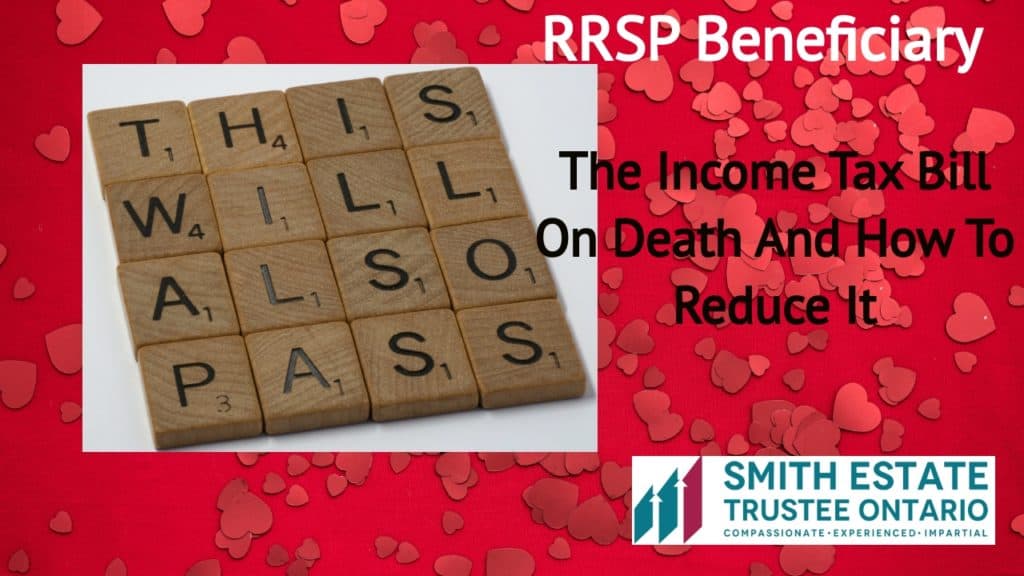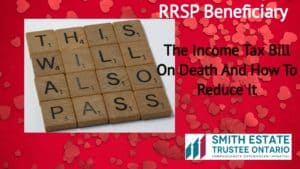
We hope that you and your family are safe, healthy and secure during this coronavirus pandemic.
Ira Smith Trustee & Receiver Inc. and Smith Estate Trustee Ontario are absolutely operational and Ira, in addition to Brandon Smith, is readily available for a telephone consultation or video meeting.
If you would prefer to listen to the audio version of this Brandon Blog, please scroll to the very bottom and click play on the podcast.
RRSP beneficiary: Death of an RRSP annuitant
As I have written before, in addition to insolvency work, we also act as an independent Estate Trustee through our business Smith Estate Trustee Ontario. In our work as Estate Trustee of a deceased estate, we have come across an interesting topic when it comes to the will of the deceased and the inheritance of an RRSP beneficiary.
Understanding the tax implications of a beneficiary entitled to an RRSP inheritance can save or cost you thousands of dollars depending on how the RRSP is administered. The Canada Revenue Agency (CRA) has specific rules regarding what happens to an RRSP when its owner dies. Did you know that there are a number of tax implications that come with inheriting RRSPs? This is especially true when you are inheriting from distant relatives like grandparents, aunts, uncles, or cousins. As an assignee of a Registered Retirement Savings Plan (RRSP), you are entitled to all of the funds in the plan, but it is possible that the account balance could be taxable.
In this Brandon Blog, I discuss the income tax ramifications on an RRSP beneficiary. By definition, since it is an RRSP available to be inherited, rather than a Registered Retirement Income Fund (RRIF) or an annuity, I am talking about:
- someone who died before turning 72 years old; and
- never had the opportunity to enjoy retirement.
I remind you that I am not an income tax practitioner, but rather, I am a licensed insolvency trustee. So this Brandon Blog is not meant as income tax advice and should not replace the advice of your qualified income tax advisor.
RRSP beneficiary designation: Designating your estate or other beneficiaries
Setting up an RRSP is a great way to save for retirement. You contributed to your plan each year and got a tax break from the government. This is a fantastic deal, so many people take advantage of it. If you only name the heir or heiress in your will, that should be sufficient. However, a will can be challenged. If you don’t name one at all for your plan, or if you are not a special type of grantee, there can be some serious tax implications.
The inheritor you name for your RRSP during your lifetime is the person who will receive the asset after your death. You can appoint a recipient directly in your RRSP plan document much in the way that you name one for your life insurance policy. I recommend that you do this. Do not just name your estate and then maybe name the real RRSP beneficiary in your will.
The CRA has adopted a special policy regarding the tax treatment of RRSPs. This policy is referred to as the deemed disposition rule. The deemed disposition rule applies to RRSPs. When the holder of an unmatured RRSP passes away, CRA deems that the RRSP was disposed of and the funds received, right before their death.
The calculation of the funds received is an amount equal to the reasonable market price of all the property kept in the RRSP at the time of death. This amount and any other balances the deceased got from the RRSP in the year of death need to be reported on the deceased’s year of death income tax return.

RRSP beneficiary tax implications: How can the income tax bill on death be reduced?
Understanding the tax implications of an RRSP beneficiary entitled to an RRSP inheritance can save or cost you thousands of dollars depending on how the RRSP is administered. The CRA has specific rules regarding what happens to an RRSP when its owner dies.
When a person passes away and leaves an RRSP, their estate has to pay the income tax liability on the RRSP when it’s paid to the RRSP beneficiary. However, you should first ask who is a qualified beneficiary? Eligible individuals who can qualify for such beneficiary designations are a spouse, a common-law partner, or a financially dependent (infirm) child or grandchild, they can utilize the “qualified beneficiary” RRSP exemption to reduce or remove the tax obligation. If there is no qualified beneficiary, the Estate Trustee will have to pay income tax calculated based on the entire amount of the RRSP.
So the challenges for beneficiaries, in general, are twofold: 1. Are you a qualified beneficiary? 2. Can a qualified beneficiary reduce their income tax bill?
If you inherit an RRSP, is that someone will face a tax bill from CRA on the deemed disposition on death. The RRSP value will be taxed as income. Now, there are some situations in which you can reduce or eliminate the taxes. If the RRSP beneficiary is a qualified beneficiary, then the value of the RRSP can be taxed in the hands of the RRSP beneficiary, not the deceased’s estate.
RRSP beneficiary tax: Reduce the tax by rolling over
This first step of the rollover procedure is described as a “refund of premiums”. The second step is the tax-deferral portion. Where a qualified beneficiary adds the number of assets from the deceased’s RRSP in the year received (or within the first 60 days of the next year), the qualified beneficiary can declare a tax deduction under section 60(l) of the Income Tax Act (Canada) to eliminate the RRSP amount added to their income. This manoeuvre does not require the RRSP beneficiary to have sufficient RRSP contribution room. The result? This heir or heiress becomes a successor annuitant and gets a tax-deferred rollover.
To eliminate the tax on receipt of the RRSP funds, the RRSP assets are directly moved to the qualified beneficiary‘s RRSP. At tax time, the qualified beneficiary gets a T4RSP tax slip. The qualified RRSP beneficiary then includes the date-of-death RRSP amount in their taxable income but offsets it with a section 60(l) tax reduction.
The above rollover is typically seen when a qualified beneficiary is marked as the RRSP recipient. When this happens, the RRSP proceeds generally bypass the deceased’s estate, lowering probate fees (where applicable) and side-stepping the estate creditors as well as the need for complicated estate settlements.

CRA RRSP beneficiary rules: Who pays tax on inherited RRSP if the beneficiary is not a spouse, common-law partner or financially dependent children or grandchild – but is the Estate?
One of the most common errors made when determining the recipient for the RRSP is to assign the estate itself. This requires the RRSP asset to go through probate. The estate receives the tax-deferred growth that has actually been earned by the RRSP up to the date of death. However, it would additionally mean that the estate would be responsible for shouldering the tax burden on the distribution of the RRSP. This is not necessarily wrong, but from an estate planning perspective, it is the most expensive route to choose. Estate planners certainly would not choose this way unless for some reason there was no other choice.
The RRSP beneficiary problem we are dealing with or how to destroy an inheritance
The issue we are dealing with on a particular deceased estate file blends insolvency work with the work of an Estate Trustee. The deceased did not file income tax returns for the last few years of her life. We now have a pretty good handle on her income taxes and what her liability is for the years of unfiled tax returns, as well as the tax liability that will arise from the Estate trust tax return.
Based on what I have already told you about the taxation possibilities for an RRSP beneficiary, and what I am about to tell you, there is a huge problem for an RRSP beneficiary.
For confidentiality reasons, I cannot provide names and amounts, but I will explain the problem. The deceased maintained a self-directed RRSP contract through Royal Bank of Canada at Royal Bank Dominion Securities. The named beneficiary in the Registered Retirement Savings Plan document was a relative. This relative does not meet the definition of a qualified beneficiary.
So in the normal course, the Estate Trustee would work with the RRSP beneficiary to understand if there was going to be no taxable income inclusion because an RRSP rollover was taking place. If not, the estate should pay the tax, but the beneficiary obtains 100% of the value of the RRSP.
Another option is that the Estate Trustee would get the tax payable on the registered retirement income from the RRSP beneficiary and pay the income tax. The beneficiary would be left with the net amount and the tax would be paid. So everyone is square.
Which option is picked depends on if there are more assets and more beneficiaries or not.
In the situation I am acting in, the Estate is insolvent. There will not be enough money in the Estate to pay all the income tax owing, regardless of the source of the taxable income. The RRSP beneficiary also as I understand it, did not elect an RRSP rollover.
So now, in this case, where the Estate has insufficient funds to pay the taxes payable in full and the RRSP beneficiary:
- is not a qualified beneficiary; and
- did not do an RRSP rollover
the RRSP beneficiary will be liable for the income tax payable from the RRSP plan assets received. The real problem is that the year death, and therefore the year the RRSP beneficiary received their inheritance was 2018. We were appointed late in 2019 and we just now have been able to quantify the income tax payable.
So it will be 2021 or later that CRA may go to the RRSP beneficiary with their hand out. I don’t know if the RRSP beneficiary invested it all, spent it all, or a combination of the two. This my readers is how to destroy an inheritance.
RRSP beneficiary summary
I hope you enjoyed the RRSP beneficiary Brandon Blog post. If you are concerned because you or your business are dealing with substantial debt challenges and you assume bankruptcy is your only option, call me. It is not your fault that you remain in this way. You have actually been only shown the old ways to try to deal with financial issues. These old ways do not work anymore.
The Ira Smith Team utilizes new modern-day ways to get you out of your debt difficulties while avoiding bankruptcy. We can get you the relief you need and so deserve.
The tension put upon you is big. We know your discomfort factors. We will check out your entire situation and design a new approach that is as unique as you and your problems; financial and emotional. We will take the weight off of your shoulders and blow away the dark cloud hanging over you. We will design a debt settlement strategy for you. We know that we can help you now.
We understand that people and businesses facing financial issues need a realistic lifeline. There is no “one solution fits all” method with the Ira Smith Team. Not everyone has to file bankruptcy in Canada. The majority of our clients never do. We help many people and companies stay clear of bankruptcy.
That is why we can establish a new restructuring procedure for paying down debt that will be built just for you. It will be as one-of-a-kind as the economic issues and discomfort you are encountering. If any one of these seems familiar to you and you are serious about getting the solution you need, contact the Ira Smith Trustee & Receiver Inc. group today.
Call us now for a no-cost consultation.
We will get you or your business back up driving to healthy and balanced trouble-free operations and get rid of the discomfort factors in your life, Starting Over, Starting Now.
We hope that you and your family are safe, healthy and secure during this coronavirus pandemic.
Ira Smith Trustee & Receiver Inc. and Smith Estate Trustee Ontario are absolutely operational and Ira, in addition to Brandon Smith, is readily available for a telephone consultation or video meeting.


